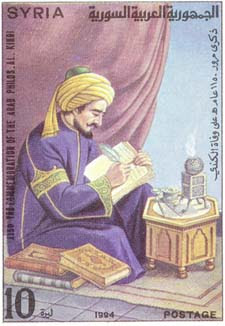"This October, the OUP Philosophy team honors al-Kindī (c. 800-870) as their Philosopher of the Month." inform John Priest, Marketing Assistant at Oxford University Press.
 |
| A Poster of Al-Kindi
Known as the “first philosopher of the Arabs,” al-Kindī was one of the
most important mathematicians, physicians, astronomers and philosophers
of his time. He composed hundreds of treatises, using many of the tools
of Greek philosophy to address themes in Islamic thought.
Abū Yūsuf Ya‘qūb b. Isḥāq al‐Kindī was born to a noble family of the Kinda tribe at the start of the ninth century, amid a period of abundant Islamic theological speculation, ḥadĪth scholarship, and the development of sophisticated Arabic literature. Al-Kindī’ was raised in Basra, an important cultural center for the study of Islamic theology and Arabic literature and grammar, and educated in Baghdad, where he likely met Syrian and Persian scholars who pursued the new learning of Greek sciences in the new capital. Having earned the support of the caliphs al-Ma’mun and al-Mu‘tasim, al-Kindī was appointed as the private teacher of Ahmad, the son of al-Mu‘tasim. He also served as the leader of the “Kindī Circle,” a group of mostly Christian scholars who translated works of Greek philosophers and scientists into Arabic—including Aristotle’s Physics and Metaphysics, Plotinus’s Enneads and the Elements of Theology of Proclus. Al-Kindī’s own philosophical work primarily took the form of epistles. From the inventory of tenth-century bookseller Ibn al‐NadĪm, we know that al-Kindī authored nearly 300 titles, much of which has been lost. The works comprising his extant corpus demonstrate al-Kindī’s depth of knowledge in an array of fields, ranging from philosophy and mathematics to astrology and gemology. Al-Kindī’ produced mathematical writing on topics such as astronomy, optics, and music. One of his major scientific contributions, De aspectibus, on the Optics of Euclid, influenced Roger Bacon. His study of mathematics led al-Kindī to a Euclidian philosophical method, and his philosophical writings were influenced by Platonist, Aristotelian, and even Stoic traditions. Al-Kindī was the first Islamic philosopher to offer systematic explanations for some of the widely debated theological issues of his time, such as creation, immortality, God’s knowledge, and prophecy. He saw the universe as an architectonic whole, not as something to be observed piecemeal to discover causality. His On First Philosophy, of which only the first four sections survive, was the first Arabic work on syncretic metaphysics. Related link |













